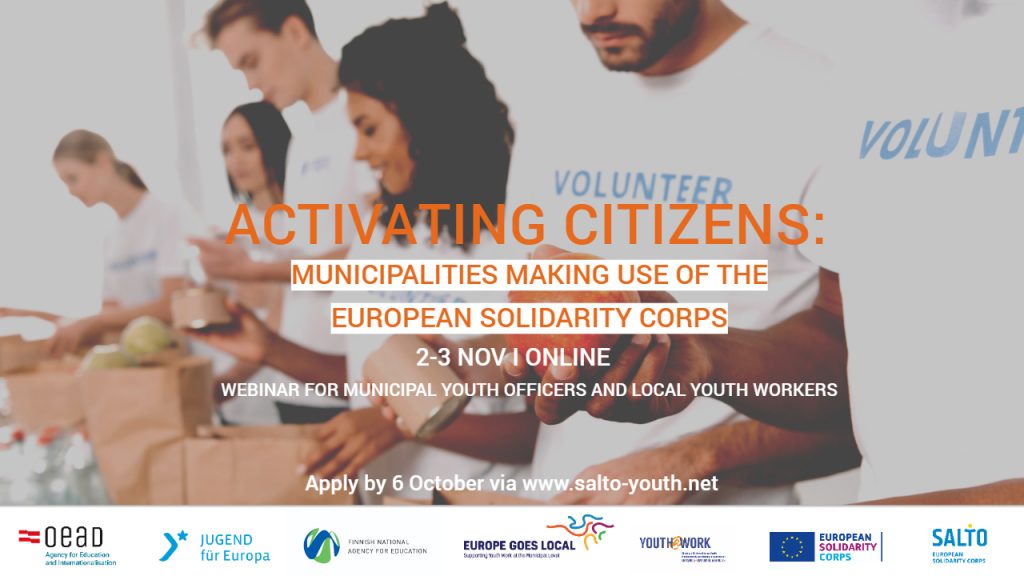
2 days, 15 municipalities, 8 best practices and a glimpse of how active citizenship supportedy the European Solidarity Corps can look like.
2nd and 3rd of November 2021 brought together representatives of municipalities and representatives of NGOs. The programme of two days consisted of networking and getting to know each other, insight into the European Solidarity programme, getting familiar with different aspects from the Quality label, up to how to apply for a project and how to create partnerships.
Four good practices were presented the first day. Gori Municipality Strategic Development Agency from Georgia shared their experiences in promoting non-formal learning processes for young people in rural areas with the support of the European Solidarity Corps. They especially outlined the great impact of a stable international partnership they implemented. The association Cubic from Austria gave insight into their various activities for young disadvantaged people; particularly their new ways of using in-country opportunities in connection with burning topics such as climate change, sustainability and employability.
A possibility of using the European Solidarity Corps on a municipality level was brought closer to us by the care center of Eggenburg. Although the European volunteers are part of the local elderly care center, they are at the same time invited to contribute to several other local activities, which is highlighting their great impact for the municipality in a broader sense. In a short video they focussed on this extended impact.
As a last example Kulturhaus Brotfabrik from Austria shared their experiences on how to create an impact with the support of European Volunteers in a big city such as Vienna. They showcased different activities together with local viennese district responsables and local young people.
To digest, participants were invited to learn more about specific aspects of the programme and the opportunities managed by the different local practices and to focus on details needed for their own project ideas.
Day 2
The second day started with five speakers, presenting different aspects about the importance of bringing support to local communities and building social cohesion through European programmes.
Andras Farkas presented the importance of research and acts of the municipalities for youth policy support. He shared the LEAP research, which was the base for the recommendations in the Cluj Napoca city.
Katarina Kuhar, representative from the Zagorje Youth center MC ZOS (https://www.mczos.si/) presented the good practice of cooperation with local schools, institutions for people with mental challenges and kindergartens. She pointed out the importance of very crucial support of the Youth center in promotion of European programmes and the added value volunteers bring to local communities.
Christiane Aschauer from Jugend:Info NÖ presented the role of their organisation in strategically approaching municipalities and some tips and tricks important when they start.
Lahti City youth service shared their experiences and as well the risk assessment tool that they have created, when searching and choosing the volunteers. They as well shared a lot of nice stories about the empowered volunteers, who changed their local life with the multiculturality that they have brought.
Barbara Eglitis from Salto European Solidarity Corps Resource Centre shared the perspective of the political importance of the programme and also the power it has to bring solidarity to the local community. She also shared the good practices of inclusion, the importance of the Inclusion and diversity strategy and highlighted the support of the programme to build inclusive environments.
At the end of the seminar, several experts were invited to share additional information on other related programmes, initiatives and funding opportunities to be used and explored. In small working groups more information on Erasmus+, Europe Goes Local, Youth@work and CERV was provided and discussed.
As an additional plus, all the different presentations and information were translated into easy language accompanied by visual graphics with Petra Plicka. Find more about the proposed information in easy translation here.
With a great tank of knowledge and hopefully a sack full of inspiring ideas this edition of the seminar Active Citizens was closed. To be continued in 2022.
Accessibility
International sign language interpreters were present at the event.
Practical information
Find more information for the event at Salto Youth.